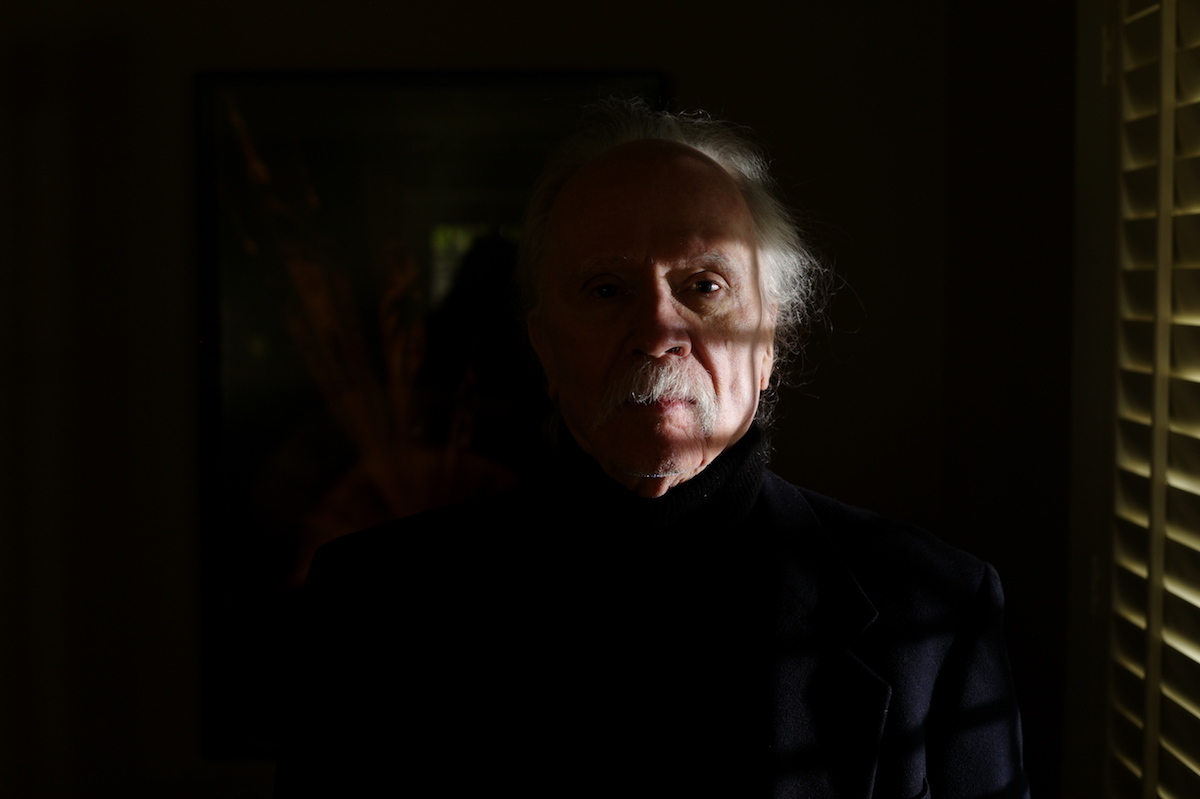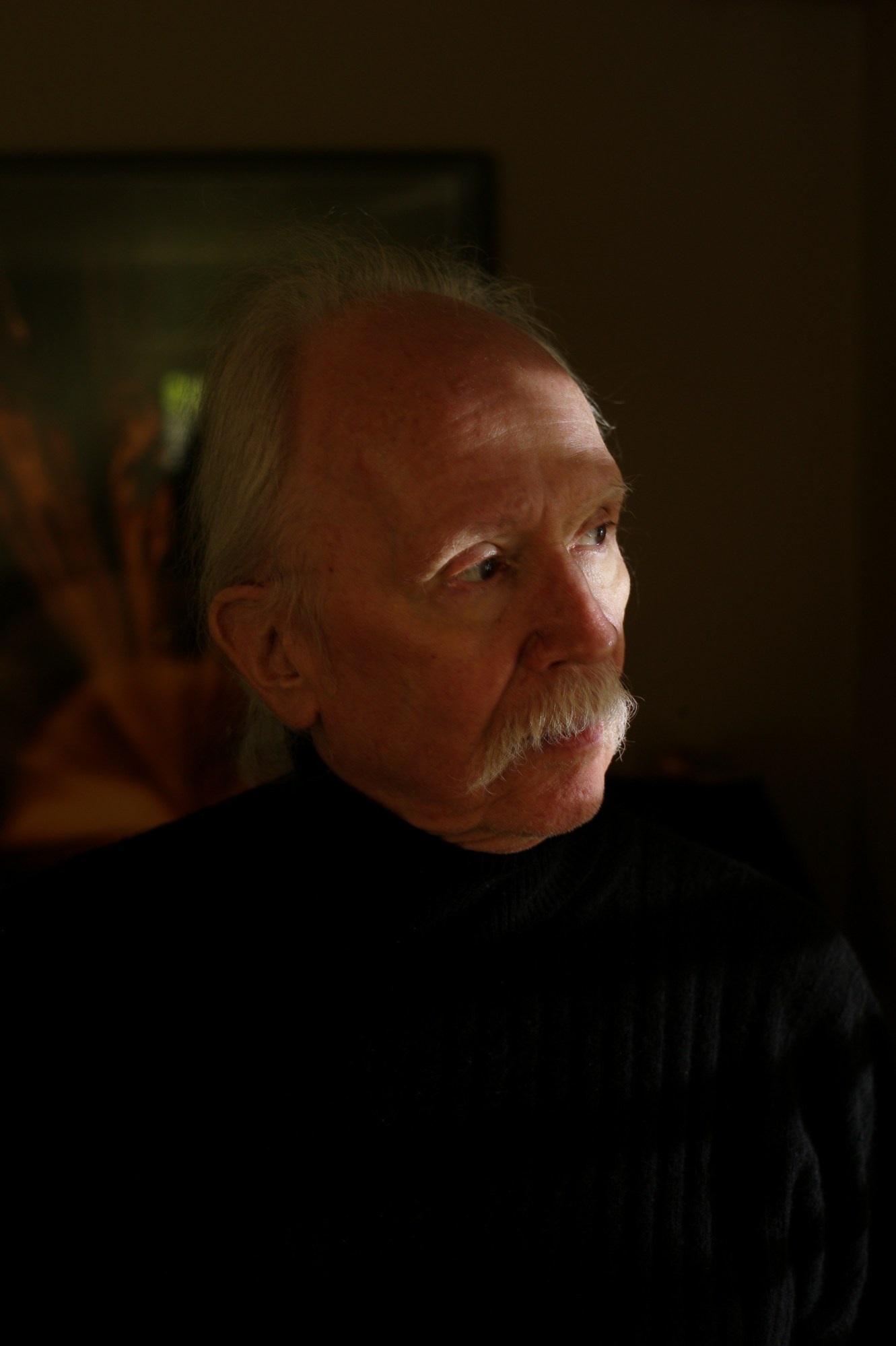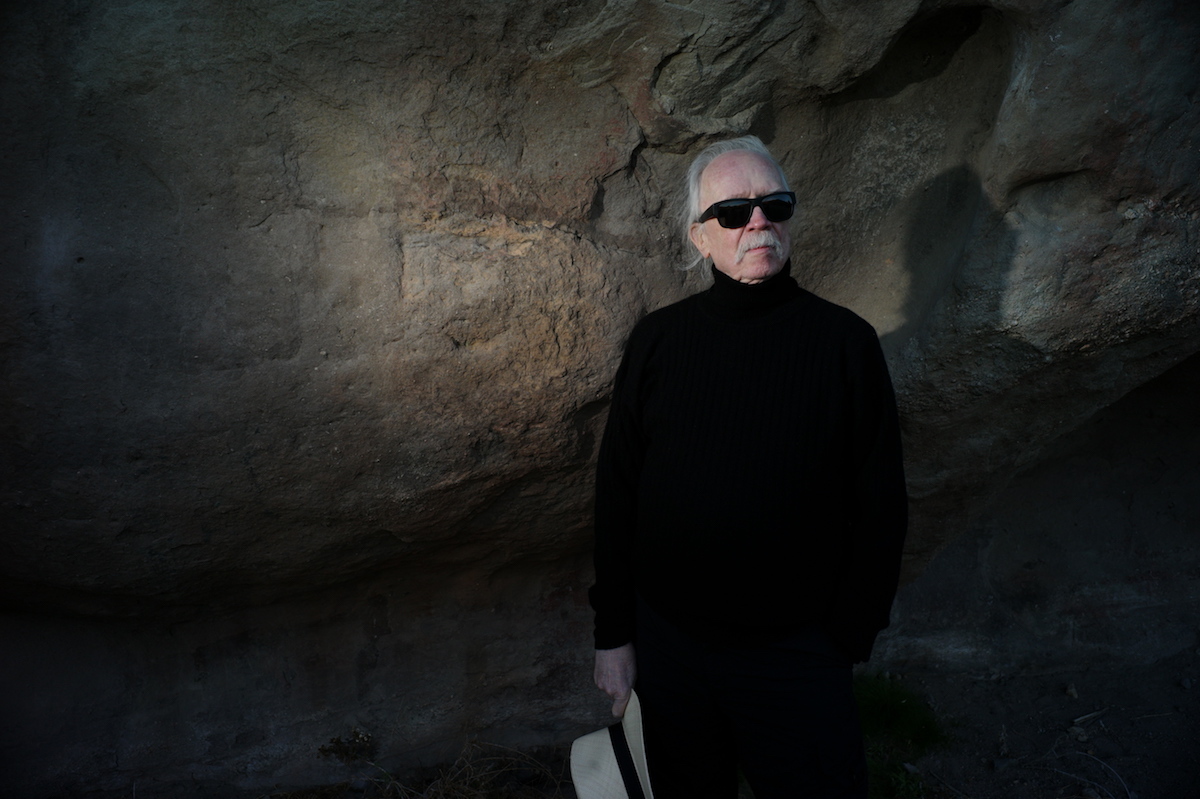It’s not that you don’t expect the office of horror maestros to use hold music. Even horror maestros need to put people on hold occasionally (it builds suspense). It’s just the waltzing muzak that greets you when you phone director-composer John Carpenter’s LA study is so light, so plinky-plonky, it hardly seems befitting of the man whose electronic music scores have, over the course of five decades, come to define the art of a tension-filled-build-up perhaps better than any other. Then again, John Carpenter is disarmingly nice for the, admittedly reluctant, forefather of the slasher genre many trace back to his cult 1978 flick Halloween.
“How’s the weather over there?” he asks brightly, from sunny California. The 68-year old has reasons to be cheerful, of course. Last year’s Lost Themes, a record he made with son, Cody, and godson, Daniel, while messing around between computer game sessions, was his first studio album proper; a late-period success that took the sinister-synthesizer-sound of his movie soundtracks (most of which — Assault on Precinct 13, Halloween, The Fog, Escape From New York, They Live and countless others — were hastily composed and home-recorded on a shoestring) and distilled them into film-less form. Its follow-up, last month’s Lost Themes II, continues the current purple-patch, expanding on the affecting atmospherics of its predecessor and confirming the oft-quoted belief that horror-auteur studio albums are like buses: you wait forever and then two come along at once (again, it builds suspense). With his first ever run of live dates kicking off in LA later this month, we spoke to the ultimate in soundtrack terror about what to expect, what inspires him and how horror is due a reinvention…
You‘re making your live debut this month. Are you excited? Are you nervous?
All of the above. The answer is yes. It’ll be fun. A lot of fun.
You‘re performing a mix of old and new, aren‘t you?
Well, mostly I’d say it’s about 75% scores from movies and 25% new stuff.
And why did you decide the time had come to perform live?
We had a meeting with these agents and they said, “You know, you can go out there and have a good time.” I wasn’t sure of that, but the family worked on me and I said, “Well, you know what? I could.” And what would be really cool would be, I’d be playing with my son and my godson. And not many people get that chance this late in their lives to do that. So, I thought, okay, I’ll do it! So it started out as a two-week, twenty city tour, real small, real easy and it grew into this monster.

Presumably you know what you‘re going to be doing visuals-wise…
I do know. Yes, I do now. You want me to tell you? Oh, I see! That’s a different subject!
Do these last couple of records like a continuation of 40 years of soundtrack work or do they feel like like something separate?
Similar but totally different. The process and everything about it is just vastly different. And I’m just kind of learning as I go, like, what is all this shit? I don’t understand! What’s this business, this weird-ass business? It’s crazy.
But you used to play in groups growing up, didn‘t you?
Sure, I was in cover bands and stuff like that, but I’d never thought about taking my scores out. And basing playing live on synthesizer-based music. I’d just never thought about that. I don’t know why… Maybe it’s my lack of imagination. I just never conceive that. Now we’ve been playing for quite a while here, we’ve been playing the music we’re going to do live and it’s unbelievable. It’s the old stuff and the new stuff! It’s great. It’s fun.
Did this new record spur you on? It sounds like a lot of it was recorded together this time.
Sure! That was a big part of it. We had a great time playing together. The joy of making music. You can’t over emphasize that. It’s a lot of fun.
How did you first end up pursuing filmmaking instead of music?
I fell in love with movies when I was very young. I saw a movie that sort of changed me. 1956, I was about eight years old, I saw a movie called Forbidden Planet. That was a different time, I was a different person. But that movie was just transformative. And it had a groundbreaking electronic score. And everything about that film took me to another place. Literally to a Forbidden Planet. So I though, ‘I have to do this,’ not knowing anything about the film business. So I started experimenting with my father’s 8mm camera. Movies became my first love. Cinema became my first love.
When did you begin composing scores to your films?
I went to film school, studied it and learned it and music was always secondary. Music was a self-defensive thing. You play music because no student filmmaker or low budget filmmaker really has the money to afford a score. We just don’t have that. We can’t do that. That’s just not in the cards. So I knew I had minimal chops, I wasn’t a great player but I was good enough, to cobble together some scores. And that’s how it all started.
And was that lack of budget behind your use of the synth? Because you could manipulate the sound?
Absolutely! You got it! That’s the reason. Because you could sound big by just multi-tracking yourself over and over and over again. And if you could already play a couple of decent notes you were already in the game. You were in good shape.
What were you listening to around that time?
I loved Tangerine Dream. Oh, there’s a bunch of stuff I was listening to. You know, I started with loving rock ‘n’ roll, just like a normal teenager, and then it grew from there. Over the years my tastes have changed a bit, but I still love some of the early stuff that I fell in love with back then.
Were you always aware of the importance of music within a film?
Sure. All you had to do was go to a movie to figure that out! That was pretty easy. And I began to establish the names of some of the composers that were incredibly influential. That’s where my love for Bernard Herrmann started taking shape. The scores that he provided for movies, especially Hitchcock movies. Transformative. It was unbelievable. And he did other stuff too. The Day the Earth Stood Still, Journey to the Center of the Earth, it went on and on.
It sounds like this new record followed a similar pattern to your own score writing in the sense that you didn‘t spend forever on it…
Well it wasn’t the years in the making type stuff. That was the danger with the first one. It took a lot of time to set up and get going and we were in different cities. But this one, I talked to the record label and they said they wanted another one and we started working on it. So it came around quickly.
The first one just grew out of messing around on Logic Pro, didn‘t it?
That’s exactly what it was! Messing around!
Have you complete embraced the digital now?
I have. I think it’s great. Is that odd to say? Do I sound like a traitor?
Well, does it extend to filmmaking too? Can we expect to see you putting out films on Netflix from now on?
Well, I dunno, maybe. I’d be open to it. It’s not a whole lot different, digital. Same kind of shit. You don’t turn the camera off really. It has some strangenesses to it, but I could get used to that.
You‘ve described these records as the soundtracks to “movie[s] running through [our] heads” … Did images come to your own mind when you were writing them? Did they trigger any ideas?
Sure. Every tune that you heard on these albums, images pop to mind.
Are you tempted to realize any of those ideas or are you quite happy that they‘re operating separate from film?
I’m quite happy with the way things are! Basically it’s simple and I don’t have to work very hard. That’s the way I like it!

It must be liberating not having to be sat in front of a first cut of a film. You‘re just jamming…
Oh, you have no idea. Well, first of all, just to be frank with you, the amount of stress that you go through in the movie business is profound. It’s just nature of the business. It’s just the nature of the people in it, what it’s like. Nobody ever teaches you that. Nobody ever teaches you how to deal with it. This is easy compared to that! God almighty! This is joy.
But you still love movies, right?
I love them! I love them! It’s just the business. It’s changed enormously. It’s a whole different ball game now. All these odd things that have happened. People are going to see these superhero movies all the time, so… They’re lining up for them. They’re buying tickets.
What movies have you liked recently?
There have been a bunch of movies that I’ve really enjoyed. And there are always movies every year that are really well done and it’s, oh, how’d this get made? It’s really terrific.
Any horror films?
None in a while. I think that horror films are due for a revamp or a change or a reinvention. They do every number of years. Horror movies reinvent. So it’s coming.
Will you be part of that?
I have no clue. But I will definitely be there cheering them on!
Lost Themes II is out now via Sacred Bones Records. John Carpenter performs live at Manchester‘s Albert Hall on October 28 and 29, followed by a show at London‘s Troxy on 31.
